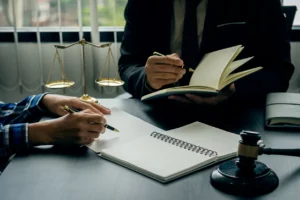 In a personal injury case, the defendant is the person or entity believed to have caused the victim’s injuries. They could be an individual, a company, or even a government agency.
In a personal injury case, the defendant is the person or entity believed to have caused the victim’s injuries. They could be an individual, a company, or even a government agency.
The plaintiff, who is the injured party, files their claim against the defendant seeking compensation for damages and harm suffered due to their actions. It’s important to understand how personal injury cases arise and what exactly a defendant’s role is.
Common Types of Personal Injury Claims

Personal injury cases can arise from a wide variety of situations. Some of the most common types include:
Motor vehicle accidents: Personal injury cases often stem from car, truck, motorcycle, bicycle, and pedestrian collisions.
Slip and fall accidents: Property owners may be held responsible if their negligence leads to a hazardous condition that causes someone to slip or trip and get injured.
Medical malpractice: When a healthcare professional’s negligence leads to injury or illness, this could form the basis of a civil claim for compensation.
Product liability: If a defective product causes physical injuries, manufacturers, distributors, and retailers could potentially face legal action.
Workplace accidents: Work injuries could give rise to a personal injury claim. Depending on your individual circumstances, filing a workers’ compensation claim may be required instead.
Dog bites: Dog owners may be held liable if their pet bites someone and causes injury.
Common Defenses Raised By Defendants in Texas Personal Injury Cases
In personal injury law, the defendant refers to those being accused of inflicting injuries upon a plaintiff (the injured party filing a lawsuit). Upon being served, the defendant may choose to negotiate, deny liability, or suggest that the plaintiff is partially at fault.
As such, some commonly used defenses in personal injury cases include:
Modified comparative negligence: Under this defense, the defendant asserts that the plaintiff contributed to their own injuries. This could potentially reduce the compensation awarded or prevent the plaintiff from recovering any damages.
Assumption of risk: If the plaintiff knew of the risks involved and still chose to engage in the activity that resulted in injury, this could potentially negate any right for compensation.
Expiration of the statute of limitations: Most Texas personal injury claims must be filed within two years of the accident date. If the plaintiff fails to comply with the deadline, this could provide grounds for dismissal of their case by the defense.
Proving That a Defendant is Liable for a Personal Injury
To succeed in a personal injury case, victims must prove that the defendant is liable. There are various ways of establishing liability.
Negligence lies at the heart of most personal injury claims. It occurs when a person breaches their duty of care to others, resulting in harm.
Proving negligence involves establishing four key elements:
- Duty of Care: The defendant had a legal responsibility to the plaintiff (injured person) to act with care. This includes, for example, obeying traffic laws or providing a safe environment for customers.
- Breach of Duty: The defendant failed to fulfill their duty of care to the plaintiff, such as by not following safety protocols or disobeying traffic laws.
- Causation: The defendant’s breach of duty caused injury or harm to the plaintiff. It is crucial to prove that the injuries would not have occurred without the defendant’s actions.
- Damages: The plaintiff must have sustained losses or damages as a result of the defendant’s breach, such as medical costs, lost wages, and pain and suffering.
A Texas personal injury lawyer can help you prove that the defendant is liable for your damages.
How To Build a Strong Personal Injury Case
To build an effective personal injury case, victims need to gather evidence, consult an attorney, and follow doctor-prescribed protocols quickly and decisively.
Here’s how you can take these steps:
Gather Evidence
Collecting evidence is essential in supporting your case.
Keep a record of all the relevant documents, including:
- Medical records
- Accident or incident reports
- Receipts for expenses related to the injury
- Photographs of the accident scene and your injuries
- Witness statements and contact information
The more documentation you have, the stronger your case will be.
Hire an Experienced Personal Injury Attorney
Hiring an experienced personal injury attorney is crucial in securing fair compensation.
A skilled attorney can:
- Help you understand your legal rights and options
- Navigate complex legal procedures
- Investigate the incident and gather evidence
- Negotiate with insurance companies on your behalf
- Represent you in court, if necessary
Most Austin personal injury attorneys offer free initial consultations, so it’s best to speak to a few different lawyers before making a decision.
Follow Your Doctor’s Advice
As part of any successful personal injury claim, evidence must show that all efforts have been made to recover from injuries suffered in an accident.
This includes:
- Following your doctor’s treatment plans and recommendations
- Attending all medical appointments
- Avoiding activities that may worsen your condition
By doing so, you’re showing a commitment to your recovery and minimizing the chance of any arguments that you failed to mitigate your damages.
Contact an Austin Personal Injury Attorney If You Need Help Holding a Defendant Liable
The Texas statute of limitations sets a deadline for filing your claim, so be aware of these time constraints. Additionally, acting quickly ensures that evidence remains intact and witnesses can accurately recall details.
Personal injuries can be a difficult thing to deal with. If you need help proving liability, don’t hesitate to contact an experienced Austin personal injury lawyer.